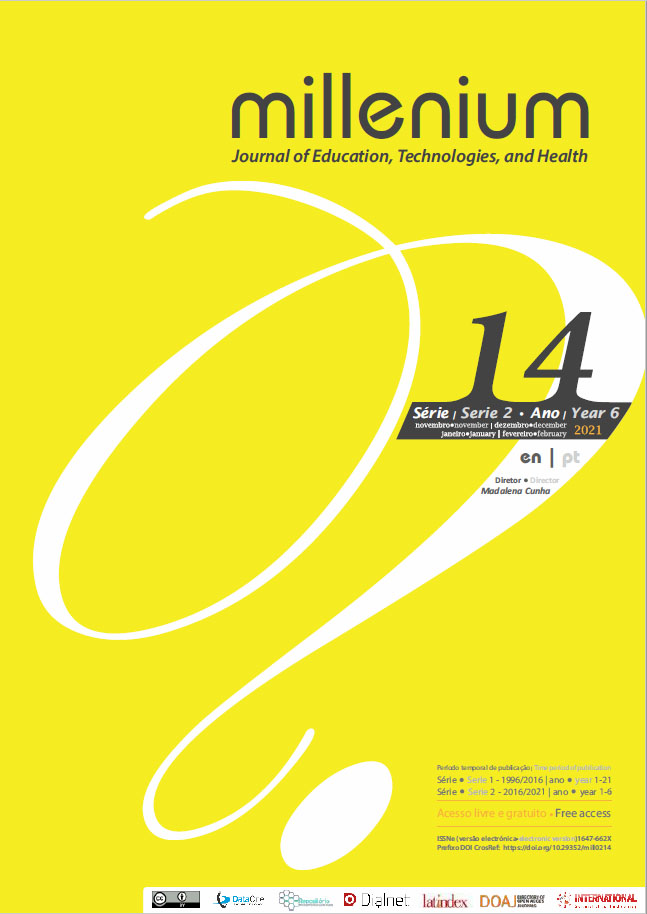Clinical supervision strategies
critical-reflective analysis of practices
DOI:
https://doi.org/10.29352/mill0214.21742Keywords:
nursing, supervisory, critical thinking, strategies, practice patterns, nursesAbstract
Introduction: The clinical supervision in nursing is a formal process of monitoring clinical practice, which aims to promote professional development, client protection and safety of care, through processes of reflection and analysis of practices.
Objective: Identify current clinical supervision strategies.
Methods: Qualitative, exploratory study. A total of 42 nurses were recruited from three health centres in the north of Portugal. Data collection was carried out through semi-structured interviews and the analysis was performed according to the principles of the grounded theory method.
Results: From the analysis, the category critical-reflexive analysis of practices emerged and the respective dimensions and subcategories. The dimensions identified were: “Intrapersonal dimension”, from which two subcategories emerged; and the “Interpersonal dimension”, from which ten subcategories emerged.
Conclusion: Results identified a set of current supervisory strategies in use, promoting professional development, namely, the critical-reflexive analysis of practices. However, several constraints of individual and contextual nature were found to interfere with the operationalization of this strategy, meaning that further research is needed.
Downloads
References
Borges, P. (2013). Implementação de um modelo de supervisão clinica em Enfermagem: perspetivas dos supervisores (Tese de Mestrado). Escola Superior de Enfermagem do Porto, Porto.
Cinnamond, J., & Zimpher, N. (1990). Reflectivity as a function of community. Em R.T. Clift, W.R. Houston, & M.C. Pugach (eds.), Encouraging Reflective Practice in Education. An analysis of issues and programs. New York: Teachers College Press.
Cross, W., Moore, A., Sampson, T., Kitch, C., & Ockerby, C. (2012). Implementing Clinical Supervision for ICU Outreach Nurses: A case study of their journey. Australian Critical Care, 25(4), 263-270. Doi: 10.1016/j.aucc.2012.01.004
Cruz, S. (2012). Do ad hoc a um modelo de supervisão clínica em enfermagem em uso (Tese de Doutoramento). Universidade Católica Portuguesa, Porto.
Dewey, J. (1933). How We Think: A Restatement of Reflective Thinking to the Educative Process. Boston: D.C. Heath & Co.
Duarte, N. (2003). Conhecimento tácito e conhecimento escolar na formação do professor (por que Donald Schön não entendeu Luria). Educ. Soc., 24, 601-625. Doi: https://doi.org/10.1590/S0101-73302003000200015
Dubé, V. & Ducharme, F. (2015). Nursing reflective practice: An empirical literature review. Journal of Nursing Education and Practice, 5(7), 91-99. Doi: 10.5430/jnep.v5n7p91
Gates, N. & Sendiack, C. (2017). Neuropsychology Supervision: Incorporating Reflective Practice. Australian Psychologist, 52, 191–197. Doi: https://doi.org/10.1111/ap.12242
Guy, L., Cranwell, K., Hitch, D., & McKinstry, C. (2020). Reflective practice facilitation within occupational therapy supervision processes: A mixed method study. Australian Occupational Therapy Journal, 67, 320-329. Doi: https://doi.org/10.1111/1440-1630.12660
Lynch, L., Hancox, K., Happel, B., & Parker, J. (2008). Clinical supervision for nurses. USA: Wiley-Blackwell.
Netto, L., Silva, K., & Rua, M. (2018). Prática reflexiva e formação profissional: aproximações teóricas no campo da Saúde e da Enfermagem. Escola Anna Nery, 22(1), 1-6. Doi: 10.1590/2177-9465-EAN-2017-0309
Pinto, D., Reis Santos, M., & Pires, R. (2017). Relevance of indicators of clinical supervision strategies in nursing. Rev Rene, 8(1), 19-25. Doi: https://doi.org/10.15253/2175-6783.2017000100004
Pires, R. (2004). Acompanhamento da actividade clínica dos enfermeiros: contributos para a definição de uma política organizacional. Dissertação de Mestrado, Universidade de Aveiro, Aveiro.
Pires, R., Pereira, F., Reis Santos, M., & Rocha, I. (2016). Most Relevant Clinical Supervision Strategies In Nursing. The European Proceedings of Social & Behavioural Sciences EpSBS, 351-361. Doi: 10.15405/epsbs.2016.07.02.34
Rocha, I. (2013). Construção e Validação do Questionário de Avaliação da Frequência de Estratégias de Supervisão Clínica em Enfermagem (Tese de Mestrado). Escola Superior de Enfermagem do Porto, Porto.
Rocha, I., Reis Santos, M., & Pires, R. (2016). Distance supervision in nursing: a reality desired by nurses. Journal of Nursing Referência, 4(10), 95-101. Doi: http://dx.doi.org/10.12707/RIV16025
Rocha, I., Reis Santos, M., & Pires, R. (2017). Questionnaire for Assessment of Clinical Supervision Strategies in Nursing: Construction and Validation of the QACSS. Nursing and Health, 5(2), 35-38. Doi: 10.13189/nh.2017.050202
Sá-Chaves, I. (2000). Formação, conhecimento e supervisão. Contributos nas áreas da formação de professores e de outros profissionais. Aveiro: Edições CIDInE.
Schön, D. (1987). Jossey Bass higher education series. Educating the reflective practitioner: Toward a new design for teaching and learning in the professions. Jossey-Bass
Snowdon, D., Leggat, S., & Taylor, N. (2017). Does clinical supervision of healthcare professionals improve effectiveness of care and patient experience? A systematic review. BMC Health Serv Res, 17(1), 786-92. Doi: https://doi.org/10.1186/s12913-017-2739-5
Strauss, A. & Corbin, J. (2008). Pesquisa qualitativa: técnicas e procedimentos para o desenvolvimento da teoria fundamentada. Porto Alegre, Brasil: Artmed.
Süleyman, D. G. & Bozkuş, K. (2017). Reflective Leadership: Learning to Manage and Lead Human Organizations, Contemporary Leadership Challenges. Aida Alvinius: Intechopen. Doi: 10.5772/64968
Tavares, J. (2013). Políticas de supervisão clínica em enfermagem em serviços de pediatria (Tese de Mestrado). Escola Superior de Enfermagem do Porto, Porto.
Zeichner, K. M. (1993). A Formação Reflexiva de Professores: Ideias e Práticas. Lisboa: EDUCA.
Downloads
Published
How to Cite
Issue
Section
License
Copyright (c) 2020 Millenium - Journal of Education, Technologies, and Health

This work is licensed under a Creative Commons Attribution 4.0 International License.
Authors who submit proposals for this journal agree to the following terms:
a) Articles are published under the Licença Creative Commons (CC BY 4.0), in full open-access, without any cost or fees of any kind to the author or the reader;
b) The authors retain copyright and grant the journal right of first publication, allowing the free sharing of work, provided it is correctly attributed the authorship and initial publication in this journal;
c) The authors are permitted to take on additional contracts separately for non-exclusive distribution of the version of the work published in this journal (eg, post it to an institutional repository or as a book), with an acknowledgment of its initial publication in this journal;
d) Authors are permitted and encouraged to publish and distribute their work online (eg, in institutional repositories or on their website) as it can lead to productive exchanges, as well as increase the impact and citation of published work
Documents required for submission
Article template (Editable format)





